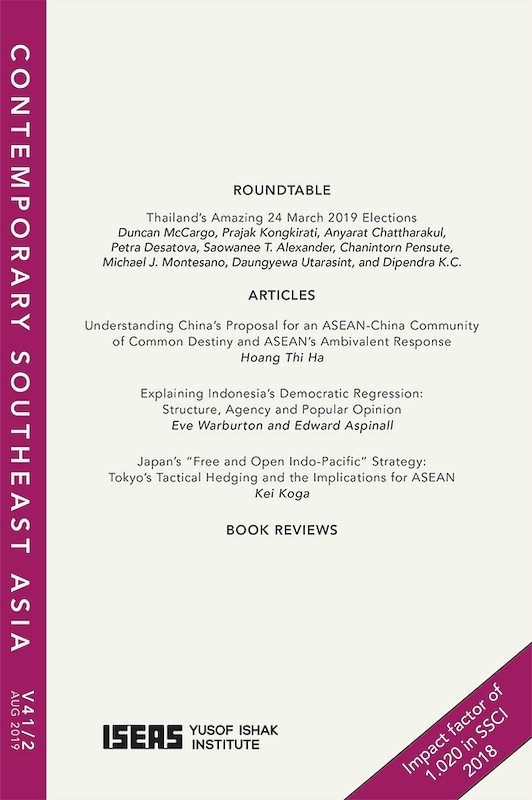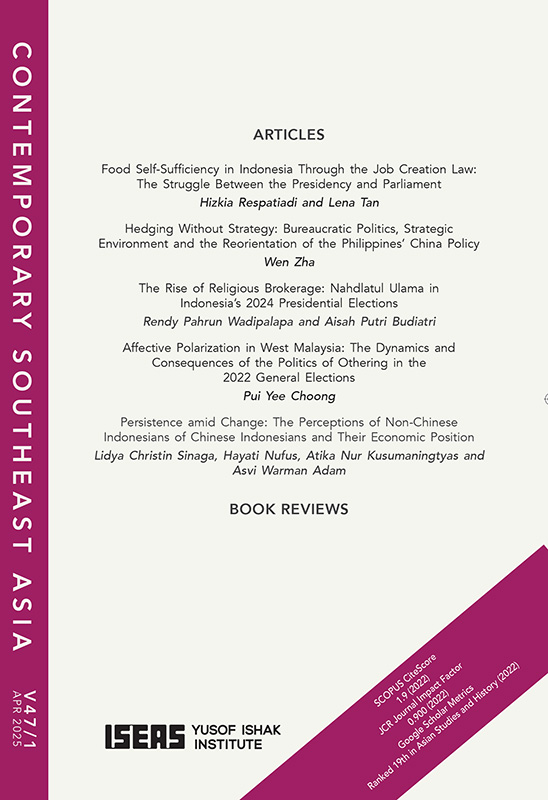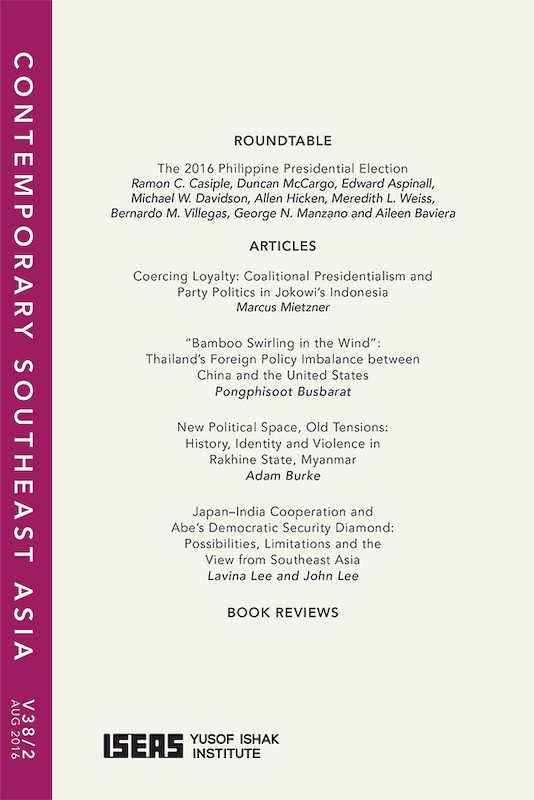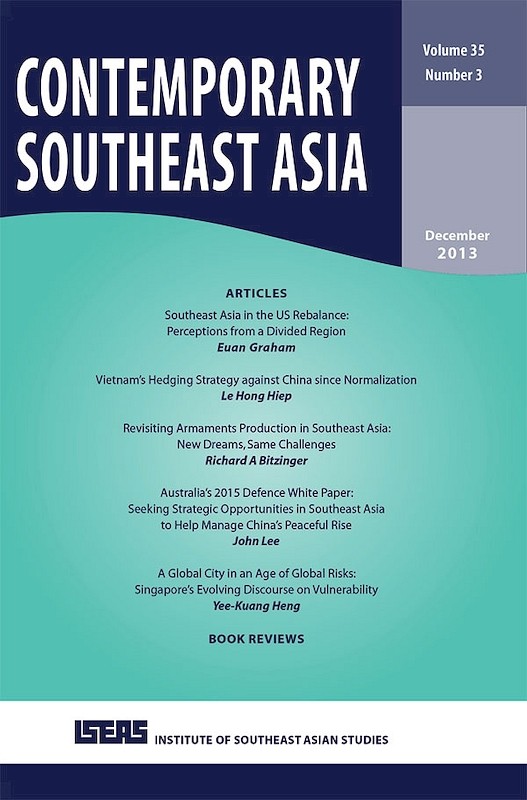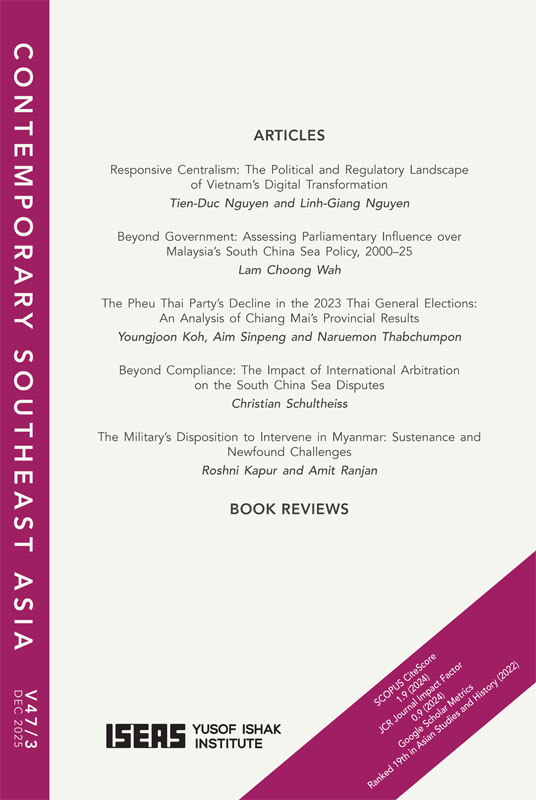Contemporary Southeast Asia Vol. 46/1 (April 2024)
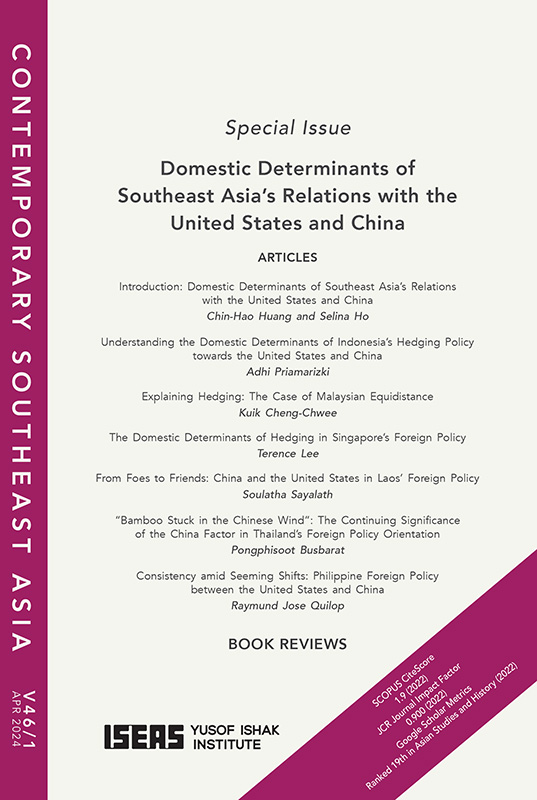
Date of publication:
April 2024
Publisher:
ISEAS – Yusof Ishak Institute
Number of pages:
185
Code:
CS46/1
Contents
-
Contemporary Southeast Asia Vol. 46/1 (April 2024)
[Whole Publication, ISSN: 1793284X] -
Preliminary pages
- ARTICLES
-
1. Introduction: Domestic Determinants of Southeast Asia’s Relations with the United States and China, by Chin-Hao Huang, Selina Ho, authors see abstractThe strategic competition between the United States and China is often seen as a rivalry confined to the two great powers alone, in which secondary states such as those in Southeast Asia have little influence and will inevitably end up “choosing sides”. However, this assumption overlooks how the domestic politics of Southeast Asian states shape their foreign policies. Furthermore, if the United States or China is to attain a leadership role and legitimacy in the region, it requires the validation, support, and deference of smaller states, none of which can be achieved without consideration of domestic politics. Thus, this Special Issue—including case studies of Indonesia, Malaysia, Singapore, Laos, Thailand and the Philippines—underscores the domestic determinants of the foreign policy of Southeast Asian states, identifying how their concerns about economic security, political legitimacy and regional stability mediate their engagement with the United States and China.
-
2. Understanding the Domestic Determinants of Indonesia’s Hedging Policy towards the United States and China, by Adhi Priamarizki, author see abstractUsing Indonesia as a case study, this article aims to contribute to the existing literature on why weaker states engage in hedging by examining how Indonesia’s domestic factors influence its foreign policy decisions regarding the United States and China. The article argues that domestic and foreign policies are interconnected as domestic agendas, including the interests and aspirations of Indonesian politicians as well as public opinion, have led to variations in the country’s hedging behaviours towards the two great powers. On one hand, domestic political and economic considerations drive Indonesia to engage with the United States and China. On the other hand, the same factors can also act as hindrances that limit Indonesia’s engagement with these powers. Consequently, despite having strong defence ties with the United States, Indonesia now sees China as a major and essential economic partner that helps the country and its leaders achieve their development goals.
-
3. Explaining Hedging: The Case of Malaysian Equidistance, by Kuik Cheng-Chwee, author see abstractFor decades, Malaysia has positioned itself as being “equidistant” between the United States and China. But being equidistant does not mean being equally distant or equally close. Instead, it means maintaining a neutral position at the macro level while seeking inclusive but selective multilayered partnerships with all competing powers across micro-level domains. While the Malaysia-US defence partnership is much closer than that between Malaysia and China, Malaysia-China diplomatic and developmental ties are more multifaceted than those between Malaysia and the United States. Therefore, Malaysia’s equidistant stance entails several puzzling contradictions emblematic of hedging. This article theorizes hedging by unpacking the two-level determinants of Malaysia’s inclusive but prudently selective and contradictory policy of equidistance. It argues that while the smaller state’s macro-level neutrality is driven primarily by the structural imperative of insuring against the danger of entrapment and other systemic risks, the inclusive and contradictory elements in Malaysia’s micro-level, multilayered alignments are primarily due to domestic reasons. Chief among these is the governing elites’ necessity to optimize the different pathways of legitimation in a multiethnic society. This intersects with other domestic processes, prompting the state to hedge by pursuing seemingly paradoxical approaches to offset risks while maximizing benefits with politically acceptable trade-offs under conditions of uncertainties.
-
4. The Domestic Determinants of Hedging in Singapore’s Foreign Policy, by Terence Lee, author see abstractIn response to the intensifying US-China rivalry, Singapore ostensibly “hedges”, a strategy that avoids choosing between Washington and Beijing and maximizes gains from cooperating with both powers while avoiding confrontation. Hedging also extenuates Singapore’s central location in Asia and its role as an established commercial and financial hub. As such, it appears to reflect the imperative of any small state: survival. However, in contrast to the argument that domestic politics does not matter in Singapore’s foreign policy, this article demonstrates how the domestic imperative of legitimizing the political dominance of the ruling People’s Action Party (PAP) shapes the government’s hedging strategy.
-
5. From Foes to Friends: China and the United States in Laos’ Foreign Policy, by Soulatha Sayalath, author see abstractDomestic politics has shaped the foreign policy of Laos (formally the Lao Peoples’ Democratic Republic, or LPDR) since the 1970s, specifically its relations with China and the United States. During the 1980s, the communist government of the Lao People’s Revolutionary Party (LPRP) feared that China and the United States were supporting counter-revolutionary resistance groups, prompting Vientiane to adopt closer relations with Beijing and Washington to ensure its own internal security by motivating them to cut off their support for anti-LPRP groups. As the Soviet Union reduced economic aid to Laos in the latter stages of the Cold War, the LPRP adopted market-based reforms in 1986 to generate closer security and economic cooperation with China and the United States and to grow its economy. Domestic concerns of regime survival and performance legitimacy remain key drivers of Laos’ foreign policy.
-
6. “Bamboo Stuck in the Chinese Wind”: The Continuing Significance of the China Factor in Thailand’s Foreign Policy Orientation, by Pongphisoot Busbarat, author see abstractThis research article examines how domestic politics has affected Thailand’s engagement with the United States and China since the 2014 military coup. It argues that Thai conservative elites, primarily the military, perceive the United States as a threat to their political legitimacy because of Washington’s emphasis on human rights and democracy. In contrast, they appreciate Beijing’s commitment to noninterference while increased economic ties with China strengthen their domestic legitimacy. Although Thailand’s foreign policy underwent an adjustment following the 2019 general elections, with Bangkok and Washington reaffirming their security ties, Thai policymakers continue to perceive China as a more dependable partner and think they must reassure Beijing that they are not aligned with the alleged US goal of containing China.
-
7. Consistency amid Seeming Shifts: Philippine Foreign Policy between the United States and China, by Raymund Jose Quilop, author see abstractThe Philippines’ foreign policy is anchored on three pillars: the protection of territorial integrity and sovereignty; economic development; and the protection of overseas Filipinos. Since these tenets were first enunciated by the Ramos administration (1992–98), they have remained constant despite perceptions that subsequent presidents have gravitated towards a closer partnership with the United States or China. Alternatively, it has been said that Manila partners with a particular foreign power to advance a particular pillar, thus creating a de facto division of roles: the United States is an ally that protects the Philippines’ territorial integrity and sovereignty, while China is a partner that advances economic development. However, the notion of a division of responsibilities is somewhat superficial. In reality, the Philippines’ relations with both the United States and China contribute to all three pillars.
- BOOK REVIEWS
-
BOOK REVIEW: Civil Society Elites: Field Studies from Cambodia and Indonesia, edited by Astrid Norén-Nilsson, Amalinda Savirani and Anders Uhlin, by Bradley J. Murg, author
-
BOOK REVIEW: Branding Authoritarian Nations: Political Legitimation and Strategic National Myths in Military-Ruled Thailand, by Petra Alderman, by Mark S. Cogan, author
-
BOOK REVIEW: Jungle Heart of the Khmer Rouge: The Memoirs of Phi Phuon, Pol Pot’s Aide-de-Camp, and the Role of Ratanakiri and Its Tribal Minorities on the Cambodian Revolution, by Henri Locard, by Jonathan Padwe, author
-
BOOK REVIEW: Electrifying Indonesia: Technology and Social Justice in National Development, by Anto Mohsin, by Maxensius Tri Sambodo, author

